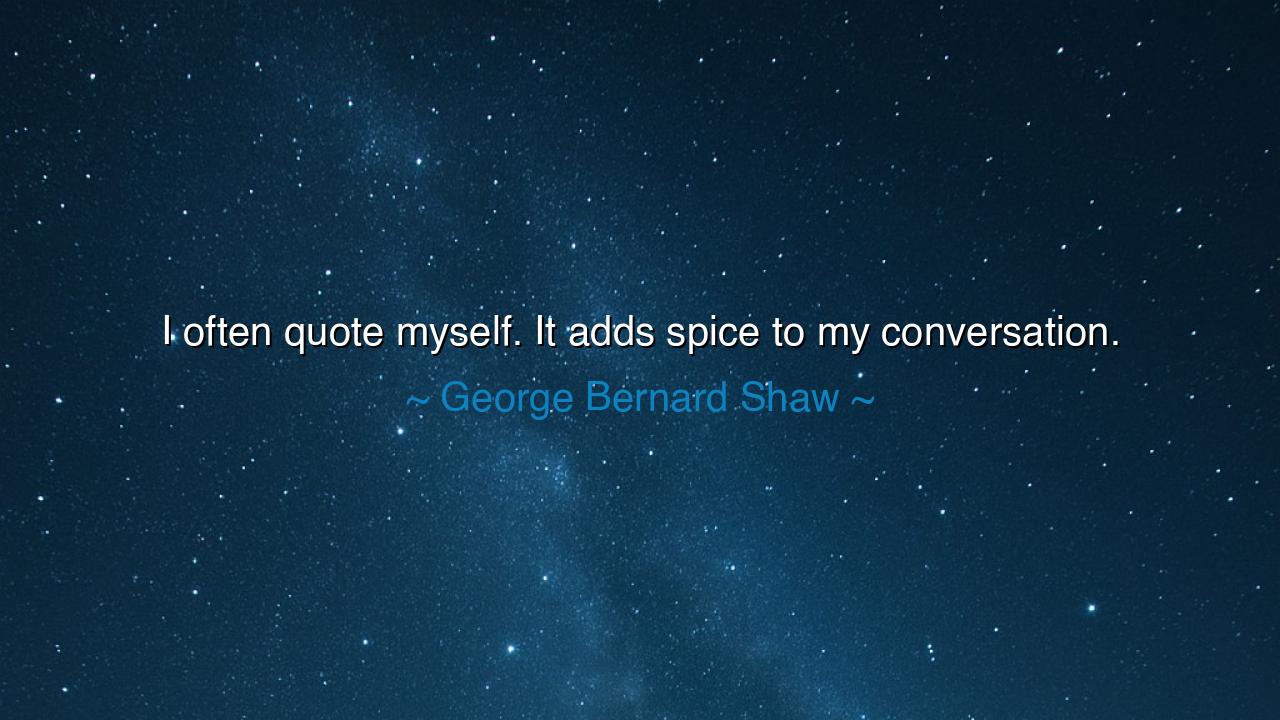
I often quote myself. It adds spice to my conversation.






Host: The café was alive with the murmur of half-bored conversations and the gentle clatter of porcelain cups. A fine drizzle tapped softly against the window, tracing crooked lines across the glass, blurring the city lights into watercolor. The air smelled of espresso, ink, and ego — that distinct aroma found wherever writers gather to hide from the world while pretending to observe it.
Jack sat at a corner table, his notebook open, a pen poised like a weapon. Across from him, Jeeny sipped her coffee — black, deliberate — watching him with that look she reserved for people who were too clever for their own good.
Jeeny: smiling “George Bernard Shaw once said, ‘I often quote myself. It adds spice to my conversation.’”
Jack: grinning without looking up “Shaw was a man after my own heart. Nothing wrong with seasoning your brilliance twice.”
Jeeny: laughing softly “You mean seasoning your vanity.”
Jack: “Same thing. Every artist’s a chef — we just use words instead of salt.”
Host: The waiter passed by, refilling cups with a flourish that suggested performance rather than service. Jack watched him briefly, then turned back to Jeeny, the glint of mischief alive in his eyes.
Jack: “You know, quoting yourself isn’t arrogance. It’s self-recycling — environmentally friendly for the mind.”
Jeeny: raising an eyebrow “So you’re saying you’re saving the planet by being self-absorbed?”
Jack: “Exactly. One brilliant monologue at a time.”
Host: Jeeny leaned back, the chair creaking slightly beneath her. Her expression softened — amused, but with a shadow of curiosity behind the humor.
Jeeny: “Shaw was joking, of course. But there’s truth in it. Artists always quote themselves — not in words, but in themes, in tone, in the way they repeat their wounds until they sound like wisdom.”
Jack: quietly “You think we recycle our pain because we’re proud of it?”
Jeeny: “No. Because we don’t know what else to do with it.”
Host: The rain outside thickened, drumming on the awning. A group of students laughed in the corner, their voices bright, unscarred. Jack’s smile faltered for a moment — the kind of pause that reveals more than silence.
Jack: softly “You know, Shaw could hide sincerity under layers of wit. That’s why people listened. Humor was his armor.”
Jeeny: “Maybe that’s why you like him.”
Jack: smirking “Are you calling me a coward or a craftsman?”
Jeeny: without missing a beat “Both.”
Host: He laughed, the sound low but warm. The café light flickered for a moment, reflecting in his half-finished espresso — a small, trembling moon.
Jack: “You ever notice how the cleverest people always end up lonely? We use words like walls — decorate them, quote them, hide behind them.”
Jeeny: nodding slowly “Because silence is terrifying for people who live in language. It doesn’t clap back, it doesn’t flatter.”
Jack: “Or quote you.”
Jeeny: grinning “Exactly. Silence refuses to feed your legend.”
Host: A pause — soft, thoughtful. The city hummed outside, a restless pulse. Jeeny set her cup down, the sound a small punctuation mark in the quiet.
Jeeny: “You know, I think Shaw was right, though — there is spice in self-reference. Every artist is seasoning the stew of their own identity. The trick is not to overcook it.”
Jack: chuckling “You mean not to drown in your own flavor.”
Jeeny: “Precisely. Self-awareness is seasoning. Self-obsession is poison.”
Host: Jack turned a page in his notebook, revealing line after line of half-written dialogue, self-portraits made of words.
Jack: “You think it’s possible to create without quoting yourself? Without repeating the same ache over and over?”
Jeeny: softly “No. But you can learn to speak it differently. To grow the voice instead of echo it.”
Jack: smiling faintly “You make it sound like evolution.”
Jeeny: “It is. Every story’s just the same wound retold until it heals — or at least learns to live with itself.”
Host: The rain softened again, easing into a rhythmic whisper. The students left, their laughter fading into the damp street. The café felt smaller now — intimate, like the inside of a thought.
Jack: quietly “Maybe quoting yourself isn’t vanity. Maybe it’s remembrance. Proof that something you once said — or felt — still matters.”
Jeeny: “That’s beautiful.”
Jack: shrugging “I’ll quote it later.”
Jeeny: smiling, shaking her head “You would.”
Host: The waiter cleared their cups, leaving only the notebooks, the pens, and the residue of warmth between them. The world outside continued — traffic sighing, neon blinking — but inside, the moment lingered like steam over coffee.
Jack: “You know what’s funny? People spend their lives trying to say something new. But the truth is, the only thing worth saying is what you’ve lived. And that always sounds familiar.”
Jeeny: “Because it’s yours.”
Jack: “Because it’s honest.”
Host: He leaned back, his eyes thoughtful, his tone no longer playful but contemplative.
Jack: “So maybe quoting yourself isn’t arrogance after all. Maybe it’s a kind of dialogue — a reminder that who you were still has something to teach who you’re becoming.”
Jeeny: softly “Then quote away, Jack. Just make sure you keep listening to the new voice behind the old words.”
Host: The camera pulled back — the café glowing in the wet evening light, the two of them framed against the glass, reflections shimmering like ghosts of conversations past. The rain outside became applause — gentle, unending.
And over it, George Bernard Shaw’s wit unfolded like a wink to eternity:
Self-quotation is not vanity — it’s survival.
The artist rewrites the self until truth tastes right.
Because in the end, we don’t quote our ego —
we quote the parts of us brave enough to still believe what we once said.






AAdministratorAdministrator
Welcome, honored guests. Please leave a comment, we will respond soon